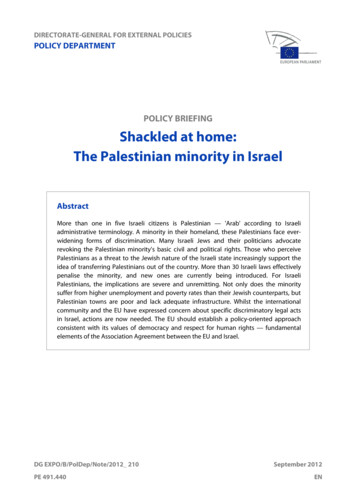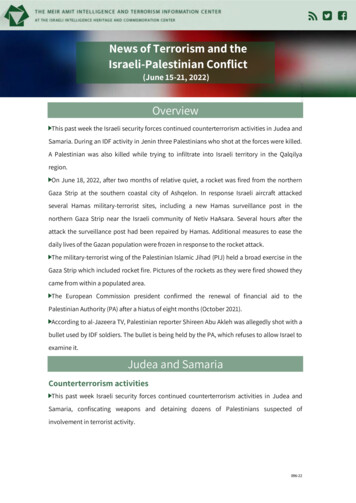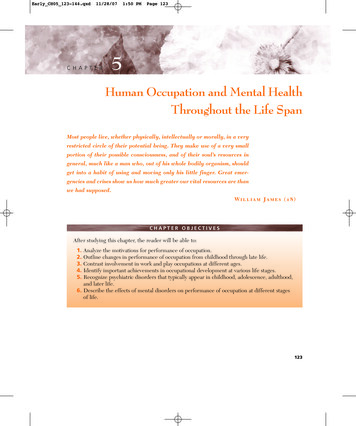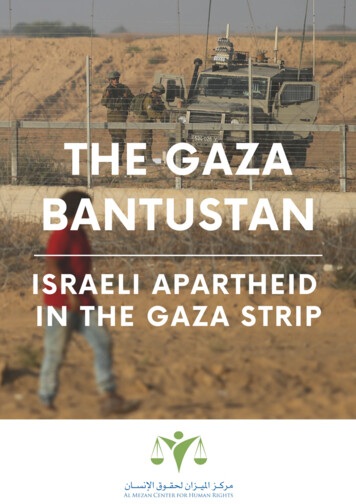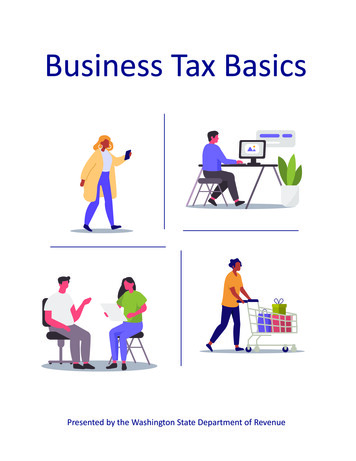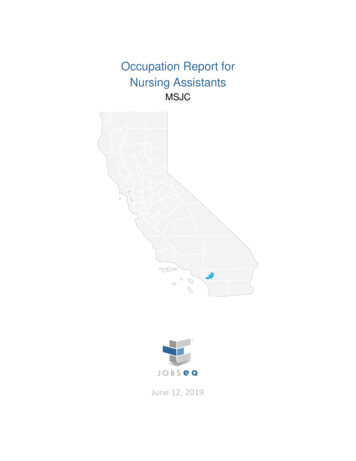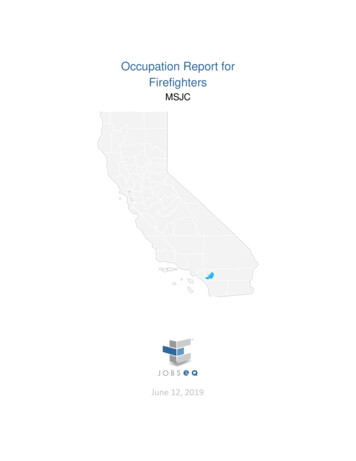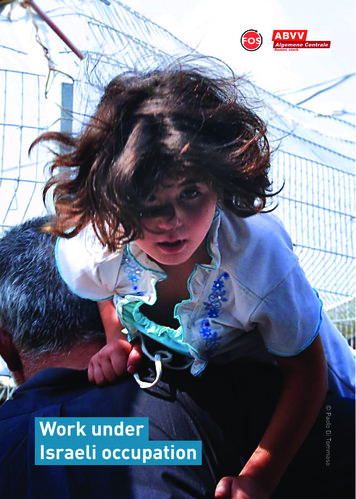
Transcription
Paolo Di TommasoWork underIsraeli occupation1
THE EVOLUTION OF PALESTINE19471949 - 1967PresentIsraelPalestinePALESTINIAN POPULATION 2,8 million in the West Bank and East-Jerusalem 1,8 million in the Gaza Strip More than 5 million Palestinian refugees in neighbouring countries2 Coverfoto Paolo Di Tommaso
Fifty years of occupationtake their tollSince half a century Palestinians are suffering under Israeli occupation. Cropsand infrastructure are destroyed, a separation barrier is installed What usedto be Palestinian territory gets more andmore dispersed throughout the years.lometres and Israeli settlements, declaredillegal by International law, make normallife simply impossible for the Palestinians.This Israeli policy of colonization hampersthe two-state solution promoted by the international community.Since the 1967 Arab–Israeli War territoriesfrom the West Bank and Gaza Strip areunder full Israeli military control. Palestinians are not only deprived of the right ofself-determination, also human rights aresystematically infringed.The blockade put in place by Israel afterHamas’s 2007 electoral victory made thepopulation in the Gaza Strip even morevulnerable. Moreover the military violence of the last years destroyed the lives ofthousands of Palestinians and takes anenormous social toll to this day.Their access to land and water is limited;freedom of movement in and between WestBank and Gaza Strip and East-Jerusalemis completely restricted. Check points,roadblocks, a separation barrier of 708 ki3
Disrupted social, politicaland economical lifeToday Palestinians face tremendouschallenges. With Hamas governing theGaza strip and Fatah the West bank, thecountry suffers complete political division.Long years of occupation caused Palestinian economy to be nearly completely dependent on the Israeli economy. All exportfrom products originating from the Gazastrip or West bank goes through Israelthat controls the external borders. Agriculture and industry deteriorate continuously: 89 % of the Palestinian companiesemploy less than 5 people. A lot of peoplework in the informal sector.The economic and social situation in theGaza strip is exceptionally harrowing. Dueto the blockade more than 60 % of thepopulation lack food security and 80 % ofthe Gazans is depending on humanitarianhelp. The private sector grinded to a haltbecause benefits from trade through thetunnels have collapsed and import andexport of goods are subject to stringentlimitations.Important sectors like agriculture andfishing are completely paralyzed due tomilitary attacks on fishing boats and confiscated agricultural land.4In the Israeli settlements on the Westbank a strong economy developed in recent years, including industrial activitiesand large-scale agricultural production.It is no coincidence that most settlementsare located on fertile Palestinian soil, controlling and exhausting water resourcesand other natural assets.In the Jordan valley e.g., a very importantagricultural region, dates, olives, figs etc.are cultivated by Israeli enterprises usingcheap Palestinian labour. These exportgoods from Palestinian soil support theIsraeli economy. Thus the Palestinianpopulation misses out on huge possibleincomes.
ISRAEL’S OCCUPATION IS STRANGLING PALESTINIAN ECONOMYAccording to international law Israel as occupying power should guarantee thePalestinians an adequate standard of living and the right to work.However Israel wilfully rendered the development of an independent Palestinianeconomy impossible and takes advantage of Palestinian products, raw materials and labour force. Due to this the Palestinian state lacks power and financialstrength to pursue its own economic policy; therefore its dependency on overseasdonors remains a structural problem.5
Increasing unemployment andintolerable working conditions inthe Palestinian territories Enric BorràsThe difficult economic situation in Palestine weakened its labour market completely.The check points, roadblocks and randomchecks make it difficult for Palestiniansto go to their work, doing business is notevident at all.Unemployment has exploded these lastyears and the financial shortage causes6enormous pressure on developing socialprotection and social security.Violation of labour rights are commonplace. Frequent infringements are: payment under the statutory minimum wage,discharge without compensation, discrimination against women, unsafe workingconditions
UNEMPLOYMENT RATE IN PALESTINIAN TERRITORIES 25 % unemployed15.5 % in the West Bank – 42 % in the Gaza strip High unemployment rate among youth42 % among youth aged 20 to 24 Huge difference between men and women40 % women compared to 21 % men(International Labour Organisation – 2015)7
Looking for work in Israelor the settlementsPalestinian labourers sometimes haveno other possibility than to look for workin Israel or its settlements. Their number had doubled over the last years.At the moment about 110,000 Palestinians (16.2 % of the economically activepopulation) work in Israel or the settlements, 1 out of 3 works without a permit.They mainly work in agriculture, heavy industry, construction or servicesOften Palestinian workers are deployed inthe most dangerous and unhealthy jobs.Employees usually end up paying medical costs themselves or left completely totheir own devices although they legallyare entitled to health care. The number ofvictims is the highest in construction industry, where most Palestinians work.According to Israeli labour law Palestinian workers have exactly the same rightsas Israeli workers. However employersuse numerous loopholes to circumventthe law. Statutory minimum wages arenot respected. Palestinian labourers areexploited and discriminated by their Israeli employer. E.g. they earn much lessthan their Israeli colleagues for the samejob. Measures for a safe working environment are hardly taken, often resulting inaccidents.LONG WAITING LINES AT CHECKPOINTSFor those who have a work permit this means long waiting lines at the checkpoints. Controls and military capriciousness cause that workers can never be surewhether they will reach their work that day or not. For security reasons Israel onlygrants a limited number of work permits therefore many Palestinians work withouta permit.8
EXPLOITATION IN THE ISRAELI SETTLEMENTSON THE WEST BANKMore than 20.000 Palestinians work inIsraeli industrial areas and farms on theWest bank.Israeli employees in the settlements usually do not hire the Palestinian workers.Often this is done through Palestinianintermediaries, responsible for recruitment, transport and payment of the wages. These ‘wasit’ (Arabic) or ‘kablon’(Hebrew) is paid by the employer but alsotakes a part of the employers’ daily wages for transport and other costs. Thisconstitutes an extremely precarious anddependent work situation for the Palestinian workers. Anyone who protests, risksbeing subjected to intimidation and resignation.High unemployment rate and low wagesin Palestinian territories force familiessometimes to also let their children workon Israeli farms. The poor educationalsystem reinforces this trend. According toa Human Rights Watch report some 500 to1,000 children work in the Jordan valley inextreme heat, exposed to pesticides, while packing tomatoes, eggplants, dates .for Israeli export. Some of them are evenyounger than 12 year. They receive poorpayment and suffer health problems frompesticides or dehydration.PALESTINIAN WORK IN ISRAELDay by day thousands of Palestinian workers cross the border with Israel on theway to their work.Palestinians who have a job, await difficulttimes. Many of them sleep in improvisedcamps close to the working areas, unprotected from military controls or violence.Employers gratefully make use of theirvulnerable situation. Therefore low wages, unsafe and unhealthy working conditions are daily occurrences.Palestinians working without a permit,cross the border illegally thus risking tobe caught by Israel’s security service.It gets more and more difficult to safelycross the border with Israel. From theGaza strip this has become nearly impossible. Who tries, gets shot. Also on theWest Bank the barrier and border controls hamper the attempts of desperatePalestinians without work permits. As Israel continues to diminish the number ofwork permits and Palestinians without apermit can hardly cross the border, a veryuncertain future is imminent.9
Struggle for decent work struggle against occupationPalestinian workers often suffer twice:not only from the occupation but also from their employers.The struggle for decent work is a struggleagainst occupation at the same time. Decent work, reliable labour legislation andsocial protection strengthen societies.Therefore Palestinian trade unions play avery important part.Yet is not exclusively a topic for tradeunions. Everyone is part of this struggle:youth, women as well as unemployed.Both in the West Bank and in the Gazastrip trade unions, social movements, organisations for youth and women do allthey can to realise this.10
Tal KingTRADE UNIONS FACE A HUGE NUMBER OF CHALLENGES Labour legislation is still in a preliminary stage The context of occupation and weak economy puts respect for labour rights underpressure The population is poorly informed on labour rights Difficult access to sectors, e.g. construction and industry, using informal labour Trade unions do not have access to the settlements or Israel to assist the workersthere11
International actionfor the PalestiniansSolidarity! In order to put an end to 50years of occupation and exploitation ofPalestinian territories, internationalpressure is necessary.boycott of products originating from thesettlements. They summon governmentsto pursue an unequivocally policy againstIsrael’s policy of colonisation.International solidarity is an importantpart of the trade unions’ work. Social movements and trade unions in Europe andelsewhere in the world are campaigningagainst the occupation and pleading for aDecent work for everybody is only possibleif we collaborate across borders. Therefore FOS, together with Algemene Centrale(General Central) of ABVV (socialist TradeUnion, n.o.t.) supports trade unions’ workin the Palestinian territory.12
A consequent policy!Belgium, but also the European Union and the other member states, have to takemeasures against Israel’s policy of colonisation and the occupation of Palestinian territories. Though they condemn Israel’s policy on a regular base, they maintain economicrelationships with the Israeli settlements that are illegal according to the InternationalCourt of Justice.FOLLOWING MEASURES ARE NECESSARY A complete stop on all economic connections with the settlements Cease all arms trade and military relations with Israel Suspension of the European association agreement with Israel A just solution for the 5 million Palestinian refugees Immediate stop on the building of the settlements End the siege on Gaza13
Do you want to know more?FOS- socialistische solidariteitwww.fos.ngoAlgemene Centrale- ABVVwww.accg.beMade in Illegalitywww.madeinillegality.orgPalestinian General Federation of Trade Unionswww.pgftu.orgB’tselemwww.btselem.orgKav LaOvedwww.kavlaoved.orgHuman Rights Watchwww.hrw.orgInternationale Arbeidsorganisatiewww.ilo.orgDo not hesitate to contact us14Karolien DebelKoen VanbrabandtFOS-socialistische solidariteitvzwkarolien.debel@fos.ngo.beAlgemene Centrale-ABVVKoen.vanbrabandt@accg.be
Danielle Pereira15
Stefano Corso@FOSngofacebook.com/FOSngor.p. Annuschka Vandewalle - Grasmarkt 105/46, 1000 BrusselFOS.ngo@FOSngo
an workers have exactly the same rights as Israeli workers. However employers use numerous loopholes to circumvent the law. Statutory minimum wages are not respected. Palestinian labourers are exploited and discriminated by their Is-raeli employer. E.g. they earn much less than their Israeli colleagues for the same job.
